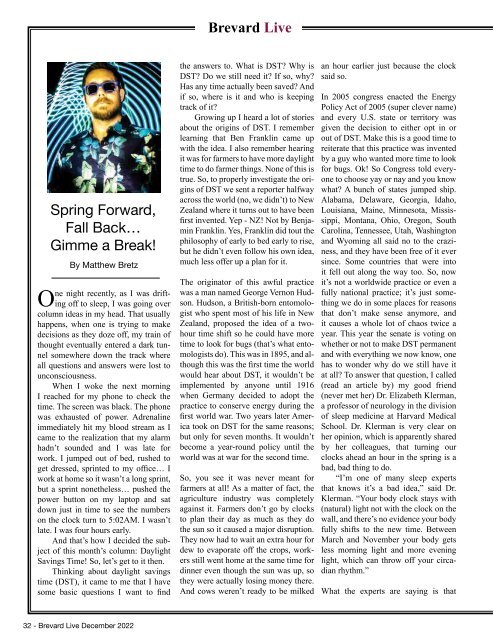Create successful ePaper yourself
Turn your PDF publications into a flip-book with our unique Google optimized e-Paper software.
Brevard Live<br />
Spring Forward,<br />
Fall Back…<br />
Gimme a Break!<br />
By Matthew Bretz<br />
One night recently, as I was drifting<br />
off to sleep, I was going over<br />
column ideas in my head. That usually<br />
happens, when one is trying to make<br />
decisions as they doze off, my train of<br />
thought eventually entered a dark tunnel<br />
somewhere down the track where<br />
all questions and answers were lost to<br />
unconsciousness.<br />
When I woke the next morning<br />
I reached for my phone to check the<br />
time. The screen was black. The phone<br />
was exhausted of power. Adrenaline<br />
immediately hit my blood stream as I<br />
came to the realization that my alarm<br />
hadn’t sounded and I was late for<br />
work. I jumped out of bed, rushed to<br />
get dressed, sprinted to my office… I<br />
work at home so it wasn’t a long sprint,<br />
but a sprint nonetheless… pushed the<br />
power button on my laptop and sat<br />
down just in time to see the numbers<br />
on the clock turn to 5:02AM. I wasn’t<br />
late. I was four hours early.<br />
And that’s how I decided the subject<br />
of this month’s column: Daylight<br />
Savings Time! So, let’s get to it then.<br />
Thinking about daylight savings<br />
time (DST), it came to me that I have<br />
some basic questions I want to find<br />
the answers to. What is DST? Why is<br />
DST? Do we still need it? If so, why?<br />
Has any time actually been saved? And<br />
if so, where is it and who is keeping<br />
track of it?<br />
Growing up I heard a lot of stories<br />
about the origins of DST. I remember<br />
learning that Ben Franklin came up<br />
with the idea. I also remember hearing<br />
it was for farmers to have more daylight<br />
time to do farmer things. None of this is<br />
true. So, to properly investigate the origins<br />
of DST we sent a reporter halfway<br />
across the world (no, we didn’t) to New<br />
Zealand where it turns out to have been<br />
first invented. Yep - NZ! Not by Benjamin<br />
Franklin. Yes, Franklin did tout the<br />
philosophy of early to bed early to rise,<br />
but he didn’t even follow his own idea,<br />
much less offer up a plan for it.<br />
The originator of this awful practice<br />
was a man named George Vernon Hudson.<br />
Hudson, a British-born entomologist<br />
who spent most of his life in New<br />
Zealand, proposed the idea of a twohour<br />
time shift so he could have more<br />
time to look for bugs (that’s what entomologists<br />
do). This was in 1895, and although<br />
this was the first time the world<br />
would hear about DST, it wouldn’t be<br />
implemented by anyone until 1916<br />
when Germany decided to adopt the<br />
practice to conserve energy during the<br />
first world war. Two years later America<br />
took on DST for the same reasons;<br />
but only for seven months. It wouldn’t<br />
become a year-round policy until the<br />
world was at war for the second time.<br />
So, you see it was never meant for<br />
farmers at all! As a matter of fact, the<br />
agriculture industry was completely<br />
against it. Farmers don’t go by clocks<br />
to plan their day as much as they do<br />
the sun so it caused a major disruption.<br />
They now had to wait an extra hour for<br />
dew to evaporate off the crops, workers<br />
still went home at the same time for<br />
dinner even though the sun was up, so<br />
they were actually losing money there.<br />
And cows weren’t ready to be milked<br />
an hour earlier just because the clock<br />
said so.<br />
In 2005 congress enacted the Energy<br />
Policy Act of 2005 (super clever name)<br />
and every U.S. state or territory was<br />
given the decision to either opt in or<br />
out of DST. Make this is a good time to<br />
reiterate that this practice was invented<br />
by a guy who wanted more time to look<br />
for bugs. Ok! So Congress told everyone<br />
to choose yay or nay and you know<br />
what? A bunch of states jumped ship.<br />
Alabama, Delaware, Georgia, Idaho,<br />
Louisiana, Maine, Minnesota, Mississippi,<br />
Montana, Ohio, Oregon, South<br />
Carolina, Tennessee, Utah, Washington<br />
and Wyoming all said no to the craziness,<br />
and they have been free of it ever<br />
since. Some countries that were into<br />
it fell out along the way too. So, now<br />
it’s not a worldwide practice or even a<br />
fully national practice; it’s just something<br />
we do in some places for reasons<br />
that don’t make sense anymore, and<br />
it causes a whole lot of chaos twice a<br />
year. This year the senate is voting on<br />
whether or not to make DST permanent<br />
and with everything we now know, one<br />
has to wonder why do we still have it<br />
at all? To answer that question, I called<br />
(read an article by) my good friend<br />
(never met her) Dr. Elizabeth Klerman,<br />
a professor of neurology in the division<br />
of sleep medicine at Harvard Medical<br />
School. Dr. Klerman is very clear on<br />
her opinion, which is apparently shared<br />
by her colleagues, that turning our<br />
clocks ahead an hour in the spring is a<br />
bad, bad thing to do.<br />
“I’m one of many sleep experts<br />
that knows it’s a bad idea,” said Dr.<br />
Klerman. “Your body clock stays with<br />
(natural) light not with the clock on the<br />
wall, and there’s no evidence your body<br />
fully shifts to the new time. Between<br />
March and November your body gets<br />
less morning light and more evening<br />
light, which can throw off your circadian<br />
rhythm.”<br />
What the experts are saying is that<br />
32 - Brevard Live December 2022


















